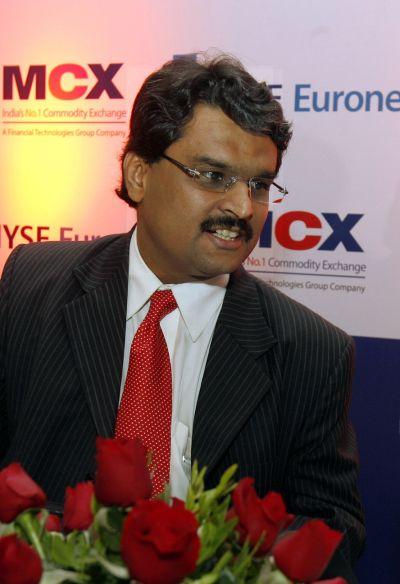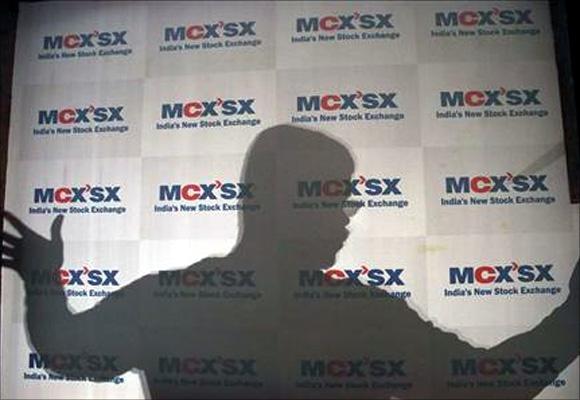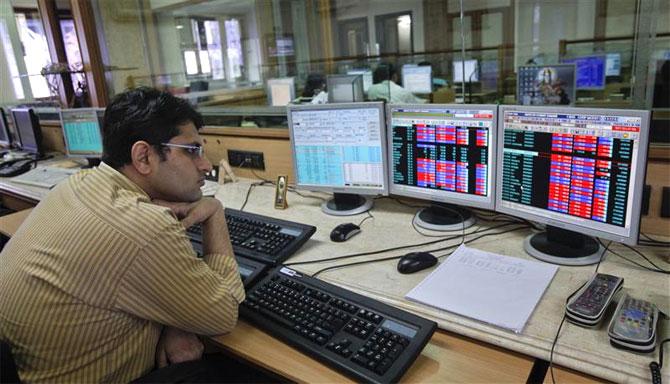Photographs: Punit Paranjpe/Reuters Rajesh Bhayani in Mumbai
A day after PricewaterhouseCoopers’ special audit report alleged several inconsistencies and gaps in the way the Multi Commodities Exchange functioned, Jignesh Shah, chairman and group chief executive officer of Financial Technologies India Ltd, tells Business Standard why he thinks the report is one-sided and makes frivolous charges.
Exuding confidence the report will have no impact on FTIL’s divestment of stake in MCX, Shah says he will completely exit all exchange-related businesses and concentrate on something new.
Edited excerpts:
The PwC report is severe on FTIL. Hasn’t it further damaged the credibility of the organisation you head?
I have gone through nightmares over the past few months.
In fact, it was almost a tsunami of bad news.
Thankfully, I have survived all that.
It’s obvious that vested interests are behind all this.
About the PwC report, I can only say that MCX has violated the principle of natural justice by not sharing the report and by not allowing FTIL to provide its clarification on PwC findings.
We reject the findings.
. . .
I have survived the tsunami of bad news: Jignesh Shah
Image: Securities and Exchange Board of India.Photographs: Reuters
But the special audit report pointed out gaping holes in MCX’s surveillance mechanism, which is supposed to be the backbone of an exchange.
The surveillance systems at MCX have been approved by the regulator and appreciated globally.
Our technology proved to be the best even during the global financial crisis and sun outages.
How do you explain the technology contract between FTIL and MCX for long tenures, of between 33 and 50 years?
There is nothing abnormal about such contracts.
When FTIL was to be listed, global investors insisted on seeing certainty of continuity of revenue.
The commercial terms for such infrastructure are like any other long-gestation infrastructure project, where long-term investments go into research to develop a flawless platform.
. . .
I have survived the tsunami of bad news: Jignesh Shah
Image: MCX paid Rs 709 crore to FTIL.Photographs: Reuters
Why was MCX not offered the right to exit the contract without paying a penalty?
The authors of the report have no knowledge of the exchange business.
All agreements were transparently disclosed in red-herring prospectuses and agreed upon by companies’ boards when the two firms were listed.
They were also vetted by reputed law firms.
MCX paid Rs 709 crore (Rs 7.09 billion) to FTIL and its warehouse company without following the norms for related-party transactions.
The money that came to FTIL was Rs 649 crore (Rs 6.49 billion) but PwC conveniently omitted the fact that it was paid for services over a 10-year period.
These were mostly technology-related service charges and linked to volumes, which rose sharply over a period.
All the necessary disclosures were made by MCX regarding the related-party contracts. What’s the big disclosure they are making now?
. . .
I have survived the tsunami of bad news: Jignesh Shah
Image: Jignesh Shah.Photographs: Paresh Gandhi/Rediff.com
The report talks about huge payments to ‘bogus’ entities.
PwC has done a blatant one-sided job.
No payments were made to bogus entities, nor was there an overcharging from MCX.
If that had happened, the financial ratios of MCX would not have been comparable with global benchmarks.
It is the only listed exchange in India that indicates its level of transparency.
MCX has created a company from scratch in just 10 years with over Rs 750 crore (Rs 7.5 billion) reserves and built its own infrastructure/building, which is easily valued at about Rs 500 crore (Rs 5 billion).
Will you take MCX and PwC to court?
We will take legal opinion on taking further action.
However, let me say PwC was indicted in the Satyam Computer case in 2008.
Huge fraud and siphoning of funds were happening in a company that PwC was auditing. MCX has been audited by Deloitte and KPMG for the past 10 years, besides being regularly audited by the commodity market regulator.
. . .
I have survived the tsunami of bad news: Jignesh Shah
Photographs: Reuters
More than half the directors on the MCX board have been independent directors. Are you saying their standards are below PwC's? What would be the impact of the latest findings on FTIL’s stake sale in MCX?
It’s strange that the report has been released at a time when FTIL is about to divest its stake in MCX.
It seems my rivals are trying to kill the entire group.
But I think the bidders, which include some of the biggest names, are mature enough to understand the game being played out.
We will take updates from out investment advisor JM Financial on this.
We can close the deal as early as May 2, if we get a binding offer. We will not only see the price but several other criteria before taking a final call.
After exiting MCX, will you still run the other exchanges under your control?
We will exit all exchange-related ventures.
We will exit all our global exchanges and sell stake in the power exchange as well.
I will concentrate on something new.
. . .







article